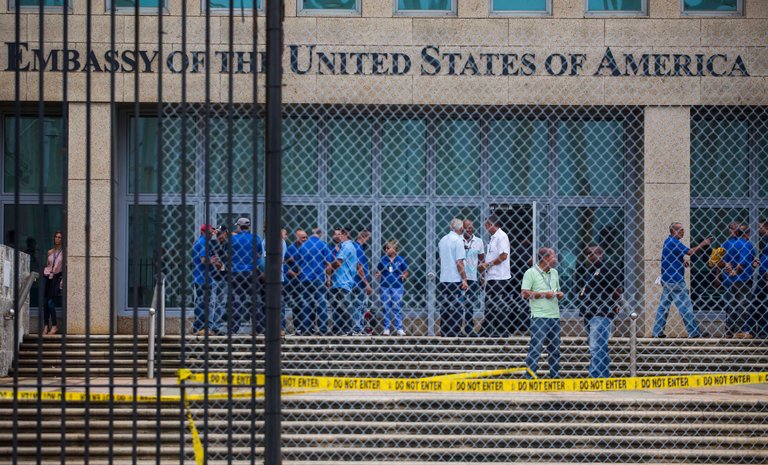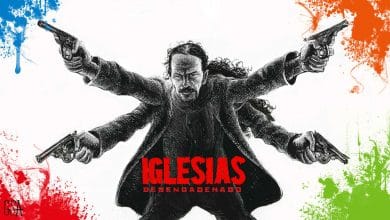
Trump Blames Cuba for Attacks That Sickened U.S. Diplomats
 WASHINGTON — President Trump said on Monday that he blamed Cuba for the mysterious attacks that sickened American diplomats there and prompted the abrupt withdrawal of United States embassy personnel from Havana. His remarks were a direct contradiction of the State Department, which has said repeatedly it does not know the cause of the illnesses, or who is responsible.
WASHINGTON — President Trump said on Monday that he blamed Cuba for the mysterious attacks that sickened American diplomats there and prompted the abrupt withdrawal of United States embassy personnel from Havana. His remarks were a direct contradiction of the State Department, which has said repeatedly it does not know the cause of the illnesses, or who is responsible.
Mr. Trump’s statement came about two weeks after his administration ordered the expulsion of 15 diplomats from the Cuban Embassy in Washington. The State Department attributed that move to what it said was Cuba’s failure to protect American diplomats stationed on its soil, as required under international law.
But senior officials in the department have said repeatedly in recent weeks that they have not yet determined who is carrying out the attacks or what precisely is causing the resulting illness. Many current and former officials say they doubt that Cuba is to blame.
The episode has cast a Cold War chill over the détente between Cuba and the United States. Mr. Trump has vowed to halt that initiative, eased under the Obama administration, calling it a “terrible and misguided deal” that rewarded a brutal government.
While the president promised to impose new regulations to crack down on travel and commerce with Cuba, his administration has yet to do so. But the diplomatic dispute over 22 Americans who have fallen ill in Havana — experiencing symptoms including tinnitus, hearing loss, dizziness, balance and visual problems, headaches and cognitive difficulties — has driven a wedge between the two countries.
“I do believe Cuba is responsible. I do believe that,” Mr. Trump told reporters in the Rose Garden on Monday during a wide-ranging news conference with the Senate majority leader, Mitch McConnell, Republican of Kentucky. “It’s a very unusual attack, but I do believe Cuba is responsible, yes.”
The statement went further than top members of Mr. Trump’s administration, who have argued that even though they do not know who or what is to blame, the attacks could not occur without Cuba’s knowledge and assent, and therefore Cuba must have the power to halt them.
“We believe the Cuban government could stop the attacks on our diplomats,” John F. Kelly, the White House chief of staff, told reporters last week when asked about Cuba’s role. Administration officials said on Monday that Mr. Trump had merely been making the same point when he said that Cuba was “responsible” for the misdeeds.
Some of the people targeted worked for the Central Intelligence Agency’s station in Havana, according to former and current United States officials. As recently as last week, officials said, the United States government had not determined who was culpable for the attacks, in which some victims reported hearing a piercing sound and others experienced symptoms consistent with traumatic brain injury.
The president also appeared to diverge from his staff on Monday regarding his coming trip to Asia.
The White House announced that Mr. Trump would travel next month to Japan, South Korea, China, Vietnam and the Philippines, where he is to meet with President Rodrigo Duterte, who has been accused by human rights groups of extrajudicial killings. Asked about the trip, Mr. Trump appeared to hedge over his willingness to visit the Philippines.
“We’ve been invited to the Philippines; I may be going to the Philippines,” Mr. Trump said, hours after his itinerary had been announced. “We haven’t set the details as of this moment.”
The remarks suggest that Mr. Trump is not satisfied with the outcome of an internal White House debate over whether he should visit the Philippines for an annual meeting of the Association of Southeast Asian Nations.
His aides had been reluctant to schedule the trip because it would entail a meeting with Mr. Duterte, an authoritarian leader who is prone to outbursts. But they ultimately decided the stop was worthwhile, partly to avoid undercutting a longstanding alliance with the Philippines, and to ensure the United States plays a role at the summit meeting, rather than allowing China to dominate the gathering.
Still, Mr. Trump, who initially lavished praise on Mr. Duterte, has soured on him in recent months, after the Filipino leader said he might be too busy to accept an invitation to the White House and called the United States “lousy.” Mr. Trump has told advisers he does not want to meet with Mr. Duterte, according to a person familiar with the plans.
Among the other issues to be ironed out with his trip to Asia, Mr. Trump said on Monday, was whether he would go to the demilitarized zone separating North and South Korea, a traditional stop for American presidents who have visited Seoul since the Korean War.
Mr. Trump, asked whether setting foot there would provoke Pyongyang, said he did not know.
“We’ll take a look at that,” the president said. “I didn’t hear, in terms of provoking.”
